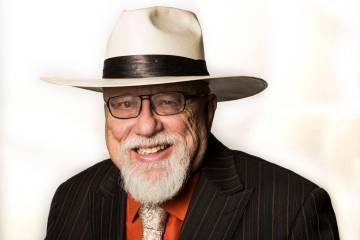Emotions shouldn’t prevail in immigration debate, Las Vegan says
If you’ve attended public hearings on rate increases for utilities or have read letters to the editor in the Review-Journal, chances are you have at least some familiarity with Marlene Drozd.
She’s a 67-year-old widow living on Social Security who relishes the right to free speech.
A recent column I wrote on Karina Garcia, who was brought to the United States at the age of 2 by parents who entered the country illegally, caused Drozd — and several others — to write and say I was too sympathetic.
Drozd said she understood Garcia’s dilemma — now living under the threat of deportation, she wasn’t told she was here illegally by her parents until she was 16 and needed a Social Security card to apply for a job — but the law is the law.
Garcia, the mother of three American-born children, could be deported from the only country she’s ever known because her situation doesn’t conform to the country’s immigration policies.
“While I feel bad for Garcia’s predicament, it is a direct result of her parents violating this country’s law and that must not be dismissed,” Drozd wrote.
While Garcia agrees her parents caused her situation — her mother apologized to her — she believes her deportation, which Drozd believes should occur, would be inhumane.
When I got in touch with Drozd, she reiterated that laws are not made to be broken.
She said that on her late husband’s side of the family, several cousins and uncles perished in Nazi concentration camps when they couldn’t come to the U.S. because of immigration quotas.
“They tried to get here legally but the number of people they allowed in was small,” Drozd said.
While Drozd said her husband’s family was not Jewish, she pointed out that the Nazis killed more than just 6 million Jews in concentration camps.
An estimated 5 million non-Jews, including people from Czechoslovakia, where Drozd said her husband’s family lived, died in the camps, according to historians.
Historians also say the U.S. — even though it had a history of providing sanctuary to persecuted peoples — tightened immigration in the years around World War II because of a sustained depression, isolationism and anti-Semitism.
“It was too bad for my husband’s family, but I can understand the need for quotas,” Drozd said.
State and local governments in the U.S., she said, cannot afford to continue spending tens of millions of dollars on illegals for their educations, hospitalizations and jail cells.
That is why, she said, she favors presumptive GOP presidential nominee Donald Trump’s plan to deport 11.3 million undocumented immigrants within two years.
I pointed out to her that studies show it would be expensive. In fact, research by the American Action Forum, a center-right wing think tank, estimates such a plan would cost about $400 billion in new federal spending alone.
Immigration authorities, who must use due process, say they now can remove 400,000 undocumented immigrants a year. To up that to millions would require 90,000 new federal agents, up from 4,000, to first apprehend and detain illegals.
The agents would then be needed to move the undocumented through the courts and to transport them to Mexico and Central America — half the undocumented are from Mexico.
Detention facilities would have to hold 10 times the 34,000 beds presently available. About 30,000 new federal attorneys would also be needed.
According to the report, about 47 chartered flights and 84 bus departures would be necessary every day for two years.
The think tank estimates the entire deportation effort, also shrinking the labor force by 6.4 percent, would reduce gross domestic product by $1 trillion, making savings from illegals’ social services and criminal activity pale by comparison.
While Drozd understands mass deportation would be costly, she said the U.S. can’t afford not to do it.
“We have to stand for the rule of law,” she said.
And she said that includes how we guard our borders.
“Our border agents should shoot in the air or at the ground first,” she said. “But if they don’t stop coming — remember they’re invading us — our agents should do what they have to do.”
Paul Harasim’s column runs Sunday, Tuesday and Friday in the Nevada section and Thursday in the Life section. Contact him at pharasim@reviewjournal.com or 702-387-5273. Follow @paulharasim on Twitter.




























